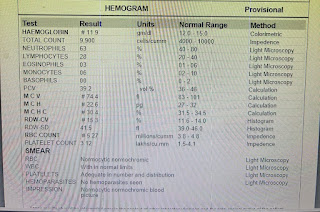INTERNSHIP ASSESSMENT
12/10/22 to 19/10/22
ICU & AMC DUTY:
- Monitored vitals of all pts hourly
-Learnt the importance of monitoring vitals
- Maintenance of ventilator settings as guided by the respective PG.
- Taken ABGs and have taken samples for lab investigations.
- Learnt how to manage in critical situations
-Learnt to work under pressure
-Learnt the importance of communication
-Learnt how to counsel the patients and their attenders
-Learnt how to deal with the death of a patient
- Assisted in intubation and central line
- Ryles have been put for 2 patients
- CPR done for 3 patients
- Foleys have been put for 4 patients
-Assisted in doing and done pleural tap
20/10/22 to 23/10/22
WARD DUTY :
- Helped my co interns in putting SOAP notes on time
- Have put cannulas and taken samples of ward patients
- Monitored patients in the ward as guided by concerned unit PG and helped them by updating the ward patients timely.
-Attended the classes regularly.
-Took videos during rounds.
24/10/22 to 26/10/22
NEPHRO DUTY:
- monitored patients who came for dialysis
- Handled Day care patients who came for dialysis.
- Learnt about dialysis machine and what all infections a pt can get by not maintaining proper hygiene of the central line
-Learnt about CABSI infections
- Learnt about central line and fistula for dialysis.
- Have removed 1 patients central line
- Assisted my PG in putting central line
-Have learnt how to give NTG to the patients and gave for 2 patients
- Have learnt how to maintain patients BP and GRBS while dialysis is going on
-Learnt how to control the chills during dialysis.
- Learnt about drugs used in hypo and hypertension.
-Learnt about the drugs given in a CKD patient
27/10/22 to 11/11/22
PSYCHIATRY POSTING
PSYCHIATRY DUTY:
- Learned about importance of history taking.
- Saw different patients and learned how to take basic history
Examples like :
1. Depression
2.Schizophrenia
3.ALCOHOL DEPENDENCE SYNDROME
4. TOBBACO DEPENDENCE SYNDROME
5. OCD
6. Psychosis
7. Panic attack
8.Bipolar disorder
- learnt the medications given to the patients and their side effects
- Went for DAC saw how pgs interact with the patients
-Learnt the tapering of drugs like lorazepam.
-Learnt the procedure of deaddiction and the drugs given to them accordingly.
12/11/22 to 11/12/22
UNIT DUTIES :
Case 1-
https://daddalavineeshachowdary.blogspot.com/2022/11/22-year-old-female-with-dengue.html?m=1
A 22 year old female presented to the OPD with chief complaints of-
-Fever with chills since 5 days
- Generalised weakness since 5 days
- Headache since 5 days
- Body pains since 5 days
- Nausea since 5 days
Case was discussed in the groups and during rounds.
- Indication for platelet transfusion in a dengue patient?
High-risk patients having platelet count < 20,000/cumm and risk of bleeding require urgent platelet transfusion. Patients with platelet count 21-40,000/cumm are in moderate risk and require platelet transfusion only if they have any haemorrhagic manifestations and other superadded conditions.
- Clinical picture of dengue hemorrhagic fever ?
Patients with DHF/DSS have fever, hemorrhagic manifestations along with thrombocytopenia and hemoconcentration. Thrombocytopenia and hemoconcentration are distinguishing features between DHF/DSS and dengue fever (DF). Some patients with dengue fever may have significant bleed and mild thrombocytopenia but no hemoconcentration. These patients are labelled to have dengue fever with unusual bleeds.
Laboratory findings in DHF/DSS include rising hematocrit, thrombocytopenia and transformed lymphocytes on peripheral smear. There may be increased transaminases, hyponatremia, transient increase in blood urea nitrogen and creatinine. In severe disease there may be lab evidence of diseamination intravascular coagulation. X-ray film of the chest may show pleural-effusion. Ultrasonogram of abdomen may detect thickened gall bladder wall with hepatomegaly and ascitis. In some patients there may be abnormality in electrocardiogram and echocardiogram. The diagnosis of DHF/DSS is based on typical clinical findings.
Case 2-
https://daddalavineeshachowdary.blogspot.com/2022/11/a-27-year-old-female-with-myalgia-and.html?m=1
A 27 year old female presented to the OPD with chief complaints of myalgia since three days.
- Causes of recurrent hypokalaemia?
Barter’s syndrome, gitelman’s syndrome, hypokalaemic periodic paralysis, Renal thbular acidosis, thyrotoxicosis, primary hyperaldosteronism, etc.
- Manifestations of low serum potassium?
Mild cases of low potassium may not cause any symptoms. But signs may include:
- Constipation
- Heart palpitations
- Extreme tiredness
- Muscle weakness and spasms.
- Tingling and numbness
More severe cases of low potassium may cause signs and symptoms such as:
- Muscle twitches.
- Muscle cramps.
- Severe muscle weakness, leading to paralysis.
- Low blood pressure (hypotension).
- Lightheadedness or faintness.
- Abnormal heart rhythms (arrhythmias).
- Excessive urination (polyuria).
- Excessive thirst (polydipsia).
Case 3-
https://daddalavineeshachowdary.blogspot.com/2022/11/23102022-student-name-d.html?m=1
A 60 year old female presented to the casualty with chief complaints of
- fever associated with chills and rigor 20 days ago for 3 days
- decreased urinary output since 15 days
- cough since 15 days
- breathlessness since 1 day
- facial puffiness since 1 day
- Cause of AKI in this patient?
This patient was found to have a source of septic foci which was speculated to be the cause of her AKI on CKD (CKD was possibly due to her NSAID abuse)
2. Causes of ARF?
ARF (also called acute kidney injury) can be divided into three main types: prerenal, renal, and postrenal.
- Prerenal causes of ARF: Prerenal ARF occurs when the blood supply to the kidneys is compromised or reduced. It is the most common type of ARF occurring in almost 60 to 70 percent of all ARF cases.
- It may occur due to several reasons such as:
- Excessive bleeding or hemorrhage
- Reduced blood pressure
- Severe diarrhea
- Heart diseases including heart failure or heart attack
- Infections
- Severe burns
- Liver failure
- Use of nonsteroidal anti-inflammatory drugs such as aspirin, ibuprofen, and naproxen
- Severe dehydration
- Anaphylaxis (severe allergic reaction)
- Renal (intrinsic) causes of ARF: This includes conditions that cause direct injury or damage to the kidneys.
- Intrinsic causes of ARF include:
- Clots in the blood vessels (arteries and veins) in or around the kidneys
- Glomerulonephritis (a condition causing the inflammation of the structural units of the kidney, called the glomeruli, which impairs the kidney's ability to filter urine)
- Lupus (a type of autoimmune disorder that causes the immune system to attack the body’s tissues)
- Infections including COVID-19
- Drug abuse
- Alcohol
- Heavy metal poisoning
- Medications that are toxic to the kidneys (such as certain antibiotics, chemotherapy drugs, and dyes used for imaging tests, including computed tomography scan and magnetic resonance imaging)
- Blood disorders such as hemolytic uremic syndrome and thrombotic thrombocytopenic purpura
- Rhabdomyolysis (a condition in which there is excessive muscle breakdown that precipitates in the kidney filtration apparatus)
- Blood vessel disorders
- Postrenal causes of ARF: These include conditions that cause blockage or obstruction to urine flow. Postrenal causes account for just 5 to 10 percent of all ARF cases.
- Postrenal causes of ARF include:
- Certain cancers such as cancer of the urinary bladder, colon, or cervix
- Blood clots in the urinary tract
- Kidney stones
- Prostate diseases such as benign prostatic hyperplasia and prostate cancer
- Damage to the nerves controlling urine flow and bladder function


Comments
Post a Comment